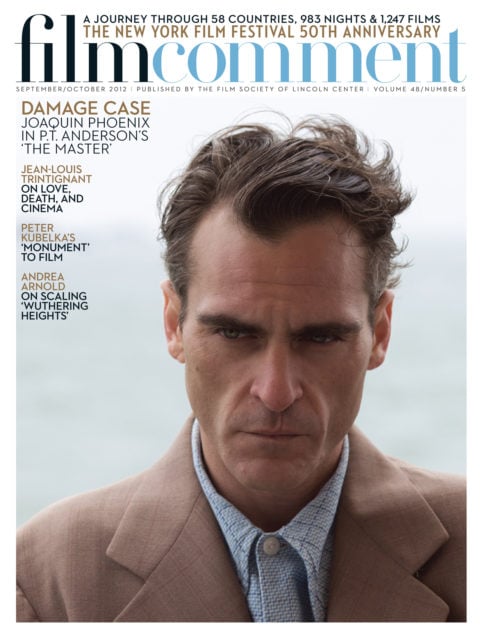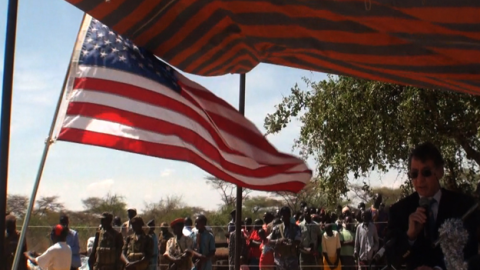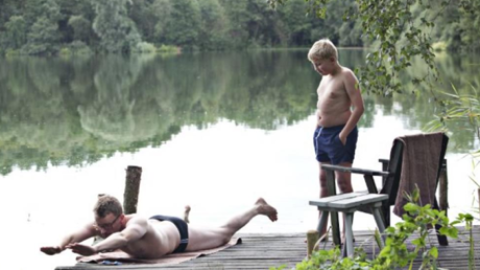
“This is what the NGOs don’t understand—that one can have fun in Africa,” notes director Mads Brügger in The Ambassador as we see him dancing with drunken pygmy villagers. As in his earlier Red Chapel (10) Brügger has devised an elaborate and foolhardy prank, this time going undercover in the Central African Republic to buy blood diamonds. He does indeed have lots of fun, though his tastes run to high-wire thrill-seeking laced with a sense of the absurd so dry it is corrosive. For the purposes of the film, Brügger casts off his usual identity (though he narrates in his own voice) and becomes the fictive Mr. Cortzen—a man with no morals, a sense of humor that runs to Hitler jokes, and a wardrobe out of a colonial fantasy. He favors knee-high boots, white suits, dark shades, and a cigarette holder. Armed with an illegally obtained (and perhaps counterfeit) diplomatic passport, Mr. Cortzen is the newly minted honorary consul from Liberia to the Central Africa Republic (“the most dangerous place on the planet”). No one finds him surprising. He is just another European opportunist looking for a quick fortune in a ravaged country. Brügger (as Cortzen) has a cover story—setting up a desperately needed match factory which he promises will employ pygmy villagers. No one (except the villagers) is fooled by this do-good act—everyone correctly surmises that Mr. Cortzen is there to smuggle diamonds, a highly dangerous enterprise that he is warned by fellow diplomats could easily end with his body in a ditch. Even more dangerous is Brügger’s plan to secretly film everything.
Soon sinister people, including high-ranking members of the ruling regime, circle around the ridiculous Mr. Cortzen and his lavish bribes (which he calls “envelopes of happiness”) in a dance of mutual exploitation. Brügger films these encounters with hidden cameras or more brazenly with still cameras that his subjects are unaware can also shoot video. It is surely a testament to the power of greed to blind people to the obvious that he gets away with this. Along the way Mr. Cortzen enters into a partnership with the unsavory M. Gilbert, owner of a diamond mine, who presents him with ridiculous and constantly changing contracts which he willingly signs. He is lied to on every front and drained of his money, but just when it seems all is lost, suddenly there is a terrifying trip to the mine in a war-torn region. There we get a quick horrifying glimpse of workers, many of whom seem to be children, toiling under armed guard. What has begun to seem a lark is slammed back into perspective—here are real victims.

As a piece of undercover journalism, this is gutsy stuff. It pays off in a disturbing portrait of chaos, corruption, and exploitation. The overt theatricality of the Mr. Cortzen persona gives the whole adventure a satirical edge—in his ridiculous amorality he illuminates the world that he trolls, which welcomes him. But there is an unsettling fun-house mirror aspect to this film: beyond each illusion there is always another. The pretense of the match factory covers for the diamond venture, which isn’t real but only a story to bait an investigation of corruption, which in turn seems itself not quite the point. At times it can seem as if the exposé element is actually less central to Brügger’s aims here than his desire to entertain a jaded art-house audience. And this desire leads Brügger into troubling ethical territory. He takes the match factory gambit much further than makes sense—setting up training sessions, hiring “pygmy assistants” and using them almost as props in a series of comic tableaux (dancing with them, towering over them in his white suit, having them paddle him around in a canoe). These scenes may be intended as a riff on colonial attitudes but at the same time they mine those attitudes for absurdist fun. Beyond that there is the cruelty, which Brügger acknowledges in the narration, of creating false hope and wasting the tribesmen’s time—but, he says, “Let me assure you that diplomats do it every day all over Africa. It is part of the game.”
Yet what game is Brügger actually playing? Has the filmmaker merged with his unpleasant alter-ego? The film revels in its provocations as it toys with issues of race and power. In the end, it passes up engagement in favor of layer upon layer of irony. Brügger seems very taken with his own cleverness—his too-cool-for-school attitude suggests that his ultimate aim is really to amuse himself. It may all be a private joke.







